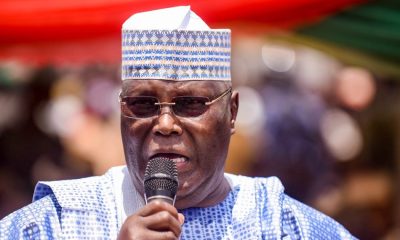NEWS
Ex-NBA Chairman Urges FG to Deduct Judiciary Allocation From Source

A former Chairman of the Nigerian Bar Association (NBA) in Ogun, Mr Emmanuel Olu-Alade, has urged the federal government to deduct and pay funds meant for the judiciary to the heads of the courts concerned.
Olu-Alade made the call in an interview with the News Agency of Nigeria (NAN) in Ota, Ogun. He urged the Federal Government to direct the Attorney-General of the Federation and Accountant General to deduct from source monies standing to the credit of the judiciary. ”’The provisions of Constitution are clear to the extent that the Judiciary both at the Federal and State Level shall be independent in line with Section 121 (3), Section 81 (3) and Section 162(9).”The Federal Government should resolve the prolonged judiciary workers strike through provisions in the Constitution,” he said.Olu-Alade said the strike was regrettable as the judiciary staff had to embark on industrial action to compel the executive to comply with the law that guarantees autonomy for the judiciary.“The strike was unfortunate as the constitution is so clear as regards autonomy for various arms of governments which includes the judiciary and the legislative.”The autonomy of various arms of governments should not have created any problem since President Muhammadu Buhari signed executive order 10 to that effect in 2019,” he said.Olu-Alade said the same should equally be done to Local Governments and Houses of Assembly.NAN reports that the union had, on May 5, vowed that the industrial action embarked upon to demand financial autonomy for state judiciaries would not be called off until the governors complied with the constitutional provisions.
JUSUN had begun a nationwide strike on Tuesday, April 6, when the union directed all its members across the federation to shut down all courts after the expiration of the 21-day ultimatum earlier given over the failure of the government to implement the law.
However on May 6, after a conciliation meeting between the government negotiating team with JUSUN and the Parliamentary Staff Association of Nigeria (PASAN), the Minister of Labour and Employment, Dr Chris Ngige, expressed optimism that the workers’ union would soon call off the strike.
NAN reports that a verdict of the Federal High Court in Nigeria’s capital, Abuja, had in January 2014, held that financial autonomy for the judiciary is a constitutional provision that must be complied with by the executive branch of government.
NAN reports that on May 23, President Muhammadu Buhari signed into law the Executive Order to grant financial autonomy to the legislature and the judiciary across the 36 states of the country.
The order also mandates the accountant-general of the federation to deduct from source amount due to state legislatures and judiciaries from the monthly allocation to each state for states that refuse to grant such autonomy.
The Minister of Justice, Abubakar Malami, the Executive Order No. 10 of 2020, made it mandatory that all states of the federation should include the allocations of both the legislature and the judiciary in the first-line charge of their budgets.
According to the AGF, “a Presidential Implementation Committee was constituted to fashion out strategies and modalities for the implementation of financial autonomy for the State Legislature and State Judiciary in compliance with section 121(3) of the Constitution of the Federal Republic of Nigeria, 1999 (as Amended).”
NAN reports that the Nigeria Governors Forum (NGF) said they will start implementing financial autonomy for the judiciary latest by May ending, a pledge that indicates that an end to the ongoing strike that has crippled the nation’s judiciary may be in sight.
The governors also called on striking members of the JUSUN to call off their two weeks old strike.
The chairman of the NGF, Gov. Kayode Fayemi of Ekiti, gave this assurance in an interview with journalists after meeting with ‘stakeholders’ from the state judiciary and legislature at the Presidential Villa in Abuja.
He said the modalities for the implementation were worked out at the meeting held at the Presidential Villa.
According to him, the meeting, chaired by the Chief of Staff to President Buhari, Ibrahim Gambari, was attended by the Solicitor-General of the Federation, the representatives of the judiciary, the representatives of the Conference of Speakers, and House of Representatives.
The first line charge status, which is being respected by the federal government in respect of the federal judiciary, entitles the state judiciaries to get funds due to them directly from the federation account.
The governors rushed to court in 2020 to challenge an executive order signed by President Buhari for the enforcement of the first line charge status of both the state judiciary and legislature.
They argued that executive order which directs the accountant-general of the federation to deduct funds meant for the state judiciaries and legislatures in the federation account and pay it to them was “unconstitutional”. (NAN)
NEWS
Osun HoS, Aina Celebrates Adeleke’s Chief of Staff, Akinleye on Birthday Anniversary

From Ayinde Akintade, Osogbo
Osun State Head of Service, Elder ‘Leye Aina has rejoiced with the Chief of Staff to Governor Ademola Adeleke, Alhaji Kazeem Akinleye, on his birthday today
The Head of Service in his birthday’s congratulatory message to the Chief of Staff and made available to newsmen in Osogbo, the Osun State capital, noted that Alhaji Akinleye is not only a God – given gift to the incumbent administration of Governor Adeleke, he is a complete divine gift to his ancestral home of Edeland because of his laudable contributions.
“Alhaji Akinleye is one of the very few political giants and highly experienced politicians who started his political career from the position of a Ward Councillor and rose to become a Local Government Chairman before his appointment as the Chief of Staff.
“In the history of Osun State, Alhaji Akinleye can be described as the best Chief of Staff so far who is accessible, firm, humane, approachable and ever ready to defend the truth.
“The Chief of Staff’s remarkable qualities, including forthrightness, contentment, courage, genuine friendship and compassion, have made him a beloved figure among his admirers, colleagues and associates.
The Head of Service noted that his heartfelt message includes prayers for Alhaji Akinleye’s continued strength, joy and influence. He prayed that his star will never go dim.
“As I wish you Happy Birthday, long life and prosperity, may the Almighty God never deny you of the reward of your love and sacrifice.
“On behalf of my family, I say Happy Celebration to you, our own Chief of Staff, the Head of Service concluded.
Foreign News
China Tightens Export Rules for Crucial Rare Earths

China has tightened export controls on rare earths and other materials critical for advanced tech manufacturing as trade negotiations continue with the US.
It processes around 90% of the world’s rare earths, which go into everything from solar panels to smartphones – a key bargaining chip ahead of an expected meeting between Chinese leader Xi Jinping and his US counterpart Donald Trump this month.
Beijing had already restricted processing technology and unauthorised overseas co-operation, but Thursday’s announcement formalised the rules.
Foreign companies now need the Chinese government’s approval to export products with even small amounts of rare earths and must explain their intended use.
The ministry announced similar restrictions on the export of lithium batteries and some forms of graphite, which are also essential components in the global tech supply chain and largely produced in China.
Beijing said the regulations are intended to “safeguard national security”. One of the main targets of these controls appears to be overseas defence manufacturers, including those in the US, who rely on rare earths from China.
China had added several rare earths and related material to its export control list in April, as the trade war with Washington ramped up, which caused a major global shortage.
But the new announcement makes clear that licenses are unlikely to be issued to arms manufacturers and certain companies in the chip industry.
Even the technology used to mine and process rare earths, or to make magnets from rare earths, can only be exported with permission from the government, the Commerce Ministry said.
Chinese firms are also banned from working with foreign companies on rare earths without government permission.
The latest announcement also clarifies the specific technologies and processes that are restricted.
These include mining, smelting and separation, magnetic material manufacturing, and recycling rare earths from other resources.
The assembly, debugging, maintenance, repair, and upgrading of production equipment are also prohibited from export without permission, the announcement added.
This could have a major impact in the US, which has a significant rare earths mining industry but lacks processing facilities.
The new regulations create Beijing’s version of US rules which block countries from selling chip-making equipment to China.
The US has used those measures to slow China’s development of powerful chips that could be used for artificial intelligence (AI) with military applications.
Trade expert Alex Capri believes China’s new regulations “are specifically timed” ahead of Xi and Trump’s expected meeting later this month.
Beijing has targeted key vulnerabilities in US electronics and weapons manufacturing, mirroring America’s earlier moves against China’s chip industry, he added.
Rare earths are a group of 17 chemically similar elements that are crucial to the manufacture of many high-tech products.
Most are abundant in nature, but they are known as “rare” because it is very unusual to find them in a pure form, and they are very hazardous to extract.
Although you may not be familiar with the names of these rare earths – like neodymium, yttrium and europium – you will be very familiar with the products that they are used in.
For instance, neodymium is used to make the powerful magnets used in loudspeakers, computer hard drives, electric car motors and jet engines that enable them to be smaller and more efficient.
China has a near monopoly on extracting rare earths as well as on refining them – which is the process of separating them from other minerals.
The International Energy Agency (IEA) estimates that China accounts for about 61% of rare earth production and 92% of their processing.
Foreign News
Madagascar President Asks for One Year to Resolve Problems or Resign

Madagascar’s President Andry Rajoelina has asked for one year to fix the country’s challenges, promising that if they persist, he will resign.
He said this during a town-hall style meeting at his palace with various groups of government supporters. Many attendees had the opportunity to ask the president questions or simply share their views – to which he responded.
“I don’t want flattery.
I want to hear the truth. It’s the people who kept telling me that everything was fine who are responsible for our current situation,” he said.The movement behind the protest, known as Gen Z Mada, has been calling for the president to resign – and rejected an invitation to attend the talks.
They argue that they cannot engage a government that has been repressing them as they demand basic human rights. The group has called for new protests on Thursday.
“We refuse the president’s invitation to talks. We will not engage in dialogue with a regime that represses, assaults, and humiliates its youth in the streets,” they wrote on their Facebook page.
At the expiry of their 48-hour ultimatum for the president to resign, the group called for a nationwide strike, although the details remain unclear.
They have vowed not to back down, urging people from all regions to join them and declaring that “the Malagasy people do not submit”.
Rajoelina has been holding these meetings as part of his pledge to “listen more”, emphasising that the challenges facing the Indian Ocean island nation can only be solved through honest conversations and not protests.
The president assured those at the dialogue that ongoing power projects would address the recurring outages by adding 265 megawatts to the national grid.
“I swear that if power cuts persist in the capital within a year, I will resign,” he said.
The protests began on 25 September triggered by anger over persistent power and water shortages, and have escalated into broader dissatisfaction over corruption, high unemployment and the cost-of-living crisis.
Last week, Rajoelina sacked his entire government and appointed an army general as prime minister on Monday. The protest movement rejected the appointment and vowed to continue their struggle.
Rajoelina came to power in 2009 after leading mass protests that triggered military intervention and overthrew then-President Marc Ravalomanana.
Although the youth-led movement continues to demand his resignation, street protests appear to have weakened.
Life in most parts of the capital, Antananarivo, continues as normal, except in a few neighbourhoods with a heavy police presence, where some roads have been blocked or are being closely monitored.
At least 22 people have died in clashes with security forces and scores more have been injured, according to the United Nations. The authorities have disputed these figures.































